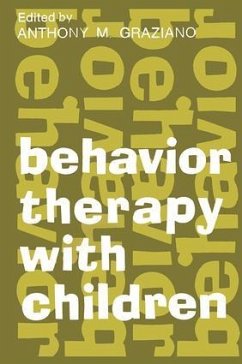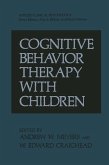- Gebundenes Buch
- Merkliste
- Auf die Merkliste
- Bewerten Bewerten
- Teilen
- Produkt teilen
- Produkterinnerung
- Produkterinnerung
This consummately well-organized survey brings together the latest and most meaningful writings in behavior therapy with children
Andere Kunden interessierten sich auch für
![Behavior Therapy with Children Behavior Therapy with Children]() Behavior Therapy with Children180,99 €
Behavior Therapy with Children180,99 €![Cognitive-Behavioural Assessment and Therapy with Adolescents Cognitive-Behavioural Assessment and Therapy with Adolescents]() Janet ZarbCognitive-Behavioural Assessment and Therapy with Adolescents170,99 €
Janet ZarbCognitive-Behavioural Assessment and Therapy with Adolescents170,99 €![Emotion Focused Family Therapy with Children and Caregivers Emotion Focused Family Therapy with Children and Caregivers]() Emotion Focused Family Therapy with Children and Caregivers170,99 €
Emotion Focused Family Therapy with Children and Caregivers170,99 €![Therapy with Harming Fathers, Victimized Children and Their Mothers After Parental Child Sexual Assault Therapy with Harming Fathers, Victimized Children and Their Mothers After Parental Child Sexual Assault]() Dale TollidayTherapy with Harming Fathers, Victimized Children and Their Mothers After Parental Child Sexual Assault187,99 €
Dale TollidayTherapy with Harming Fathers, Victimized Children and Their Mothers After Parental Child Sexual Assault187,99 €![Cognitive-Behavioral Therapy with Couples and Families Cognitive-Behavioral Therapy with Couples and Families]() Frank M DattilioCognitive-Behavioral Therapy with Couples and Families79,99 €
Frank M DattilioCognitive-Behavioral Therapy with Couples and Families79,99 €![Play Therapy with Children and Adolescents in Crisis Play Therapy with Children and Adolescents in Crisis]() Play Therapy with Children and Adolescents in Crisis65,99 €
Play Therapy with Children and Adolescents in Crisis65,99 €![Cognitive Behavior Therapy with Children Cognitive Behavior Therapy with Children]() Cognitive Behavior Therapy with Children115,99 €
Cognitive Behavior Therapy with Children115,99 €-
-
-
This consummately well-organized survey brings together the latest and most meaningful writings in behavior therapy with children
Hinweis: Dieser Artikel kann nur an eine deutsche Lieferadresse ausgeliefert werden.
Hinweis: Dieser Artikel kann nur an eine deutsche Lieferadresse ausgeliefert werden.
Produktdetails
- Produktdetails
- Verlag: Taylor & Francis
- Seitenzahl: 472
- Erscheinungstermin: 11. August 2017
- Englisch
- Abmessung: 229mm x 152mm x 25mm
- Gewicht: 794g
- ISBN-13: 9781138519343
- ISBN-10: 1138519340
- Artikelnr.: 50496419
- Herstellerkennzeichnung
- Libri GmbH
- Europaallee 1
- 36244 Bad Hersfeld
- gpsr@libri.de
- Verlag: Taylor & Francis
- Seitenzahl: 472
- Erscheinungstermin: 11. August 2017
- Englisch
- Abmessung: 229mm x 152mm x 25mm
- Gewicht: 794g
- ISBN-13: 9781138519343
- ISBN-10: 1138519340
- Artikelnr.: 50496419
- Herstellerkennzeichnung
- Libri GmbH
- Europaallee 1
- 36244 Bad Hersfeld
- gpsr@libri.de
Anthony M. Graziano
Animism and Modern Psychotherapy
1: From the Laboratory to the Clinic
1: Transition from Animal Laboratory to Clinic
2: Arbitrary and Natural Reinforcement
3: What Behavioral Engineering Is
4: A Program of Research in Behavioral Electronics
5: Behavior Therapy with Children: A Review and Evaluation of Research Methodology
2: Behavioral Approaches to Mental Retardation
6: Operant Conditioning of Social Behaviors in Severely Retarded Patients
7: Operant Conditioning in Toilet Training of Severely Retarded Boys
8: Operant Learning Theory and Nursing Care of the Retarded Child
9: Teaching of Self-help Skills to Profoundly Retarded Patients
10: Stair Ascending-Descending Behavior in Trainable Retarded Preschoolers
11: Behavior Therapy with High Level, Institutionalized, Retarded Adolescents
3: Modification of Psychotic Behavior
12: Behavior Modification and Childhood Psychoses
13: Aversive Control of Self-injurious Behavior in a Psychotic Boy
14: Acquisition of Imitative Speech by Schizophrenic Children
15: Teaching Speech to an Autistic Child through Operant Conditioning
16: Behavior Therapy for Stuttering in a Schizophrenic Child
17: A Social Learning Therapy Program with an Autistic Child
18: Programmed Psychotherapy
19: Programmed Relaxation and Reciprocal Inhibition with Psychotic Children
20: Operant Conditioning of Schizophrenic Children
4: Modification of Antisocial Behavior
21: Systematic Socialization: A Programmed Environment for the Habilitation of Antisocial Retardates
22: Short-Term Operant Conditioning of Adolescent Offenders on Socially Relevant Variables
23: An Operant Conditioning Program in a Juvenile Detention Facility
24: Use of Behavioral Techniques in a Case of Compulsive Stealing
25: Comments on Wetzel's Treatment of a Case of Compulsive Stealing
26: The Use of Stimulus Satiation in the Elimination of Juvenile Fire-Setting Behavior
5: Behavioral Approaches to School and Mild Conduct Problems
27: A Nontalking Child in Kindergarten
28: Classical and Operant Factors in the Treatment of a School Phobia
29: A Comparison of Conditioning and Psychotherapy in the Treatment of Functional Enuresis
30: Behavior Modification for a Child with Multiple Problem Behaviors
31: A Behavior Modification Technique for the Hyperactive Child
32: Effects of Social Reinforcement on Operant Crying
33: Token Reinforcement to Increase Singing Participation in Nursery School Children
6: Some Implications of Behavior Modification Concepts: The New Therapists
34: The Major Concepts Taught to Behavior Therapy Trainees
35: Training Behavior Therapists
36: Teaching Behavioral Principles to Parents of Disturbed Children
37: Mothers as Behavior Therapists for their own Children
38: Eliminating a Child's Scratching by Training the Mother in Reinforcement Procedures
39: Behavior Therapy Treatment Approach to a Psychogenic Seizure Case
1: From the Laboratory to the Clinic
1: Transition from Animal Laboratory to Clinic
2: Arbitrary and Natural Reinforcement
3: What Behavioral Engineering Is
4: A Program of Research in Behavioral Electronics
5: Behavior Therapy with Children: A Review and Evaluation of Research Methodology
2: Behavioral Approaches to Mental Retardation
6: Operant Conditioning of Social Behaviors in Severely Retarded Patients
7: Operant Conditioning in Toilet Training of Severely Retarded Boys
8: Operant Learning Theory and Nursing Care of the Retarded Child
9: Teaching of Self-help Skills to Profoundly Retarded Patients
10: Stair Ascending-Descending Behavior in Trainable Retarded Preschoolers
11: Behavior Therapy with High Level, Institutionalized, Retarded Adolescents
3: Modification of Psychotic Behavior
12: Behavior Modification and Childhood Psychoses
13: Aversive Control of Self-injurious Behavior in a Psychotic Boy
14: Acquisition of Imitative Speech by Schizophrenic Children
15: Teaching Speech to an Autistic Child through Operant Conditioning
16: Behavior Therapy for Stuttering in a Schizophrenic Child
17: A Social Learning Therapy Program with an Autistic Child
18: Programmed Psychotherapy
19: Programmed Relaxation and Reciprocal Inhibition with Psychotic Children
20: Operant Conditioning of Schizophrenic Children
4: Modification of Antisocial Behavior
21: Systematic Socialization: A Programmed Environment for the Habilitation of Antisocial Retardates
22: Short-Term Operant Conditioning of Adolescent Offenders on Socially Relevant Variables
23: An Operant Conditioning Program in a Juvenile Detention Facility
24: Use of Behavioral Techniques in a Case of Compulsive Stealing
25: Comments on Wetzel's Treatment of a Case of Compulsive Stealing
26: The Use of Stimulus Satiation in the Elimination of Juvenile Fire-Setting Behavior
5: Behavioral Approaches to School and Mild Conduct Problems
27: A Nontalking Child in Kindergarten
28: Classical and Operant Factors in the Treatment of a School Phobia
29: A Comparison of Conditioning and Psychotherapy in the Treatment of Functional Enuresis
30: Behavior Modification for a Child with Multiple Problem Behaviors
31: A Behavior Modification Technique for the Hyperactive Child
32: Effects of Social Reinforcement on Operant Crying
33: Token Reinforcement to Increase Singing Participation in Nursery School Children
6: Some Implications of Behavior Modification Concepts: The New Therapists
34: The Major Concepts Taught to Behavior Therapy Trainees
35: Training Behavior Therapists
36: Teaching Behavioral Principles to Parents of Disturbed Children
37: Mothers as Behavior Therapists for their own Children
38: Eliminating a Child's Scratching by Training the Mother in Reinforcement Procedures
39: Behavior Therapy Treatment Approach to a Psychogenic Seizure Case
Animism and Modern Psychotherapy
1: From the Laboratory to the Clinic
1: Transition from Animal Laboratory to Clinic
2: Arbitrary and Natural Reinforcement
3: What Behavioral Engineering Is
4: A Program of Research in Behavioral Electronics
5: Behavior Therapy with Children: A Review and Evaluation of Research Methodology
2: Behavioral Approaches to Mental Retardation
6: Operant Conditioning of Social Behaviors in Severely Retarded Patients
7: Operant Conditioning in Toilet Training of Severely Retarded Boys
8: Operant Learning Theory and Nursing Care of the Retarded Child
9: Teaching of Self-help Skills to Profoundly Retarded Patients
10: Stair Ascending-Descending Behavior in Trainable Retarded Preschoolers
11: Behavior Therapy with High Level, Institutionalized, Retarded Adolescents
3: Modification of Psychotic Behavior
12: Behavior Modification and Childhood Psychoses
13: Aversive Control of Self-injurious Behavior in a Psychotic Boy
14: Acquisition of Imitative Speech by Schizophrenic Children
15: Teaching Speech to an Autistic Child through Operant Conditioning
16: Behavior Therapy for Stuttering in a Schizophrenic Child
17: A Social Learning Therapy Program with an Autistic Child
18: Programmed Psychotherapy
19: Programmed Relaxation and Reciprocal Inhibition with Psychotic Children
20: Operant Conditioning of Schizophrenic Children
4: Modification of Antisocial Behavior
21: Systematic Socialization: A Programmed Environment for the Habilitation of Antisocial Retardates
22: Short-Term Operant Conditioning of Adolescent Offenders on Socially Relevant Variables
23: An Operant Conditioning Program in a Juvenile Detention Facility
24: Use of Behavioral Techniques in a Case of Compulsive Stealing
25: Comments on Wetzel's Treatment of a Case of Compulsive Stealing
26: The Use of Stimulus Satiation in the Elimination of Juvenile Fire-Setting Behavior
5: Behavioral Approaches to School and Mild Conduct Problems
27: A Nontalking Child in Kindergarten
28: Classical and Operant Factors in the Treatment of a School Phobia
29: A Comparison of Conditioning and Psychotherapy in the Treatment of Functional Enuresis
30: Behavior Modification for a Child with Multiple Problem Behaviors
31: A Behavior Modification Technique for the Hyperactive Child
32: Effects of Social Reinforcement on Operant Crying
33: Token Reinforcement to Increase Singing Participation in Nursery School Children
6: Some Implications of Behavior Modification Concepts: The New Therapists
34: The Major Concepts Taught to Behavior Therapy Trainees
35: Training Behavior Therapists
36: Teaching Behavioral Principles to Parents of Disturbed Children
37: Mothers as Behavior Therapists for their own Children
38: Eliminating a Child's Scratching by Training the Mother in Reinforcement Procedures
39: Behavior Therapy Treatment Approach to a Psychogenic Seizure Case
1: From the Laboratory to the Clinic
1: Transition from Animal Laboratory to Clinic
2: Arbitrary and Natural Reinforcement
3: What Behavioral Engineering Is
4: A Program of Research in Behavioral Electronics
5: Behavior Therapy with Children: A Review and Evaluation of Research Methodology
2: Behavioral Approaches to Mental Retardation
6: Operant Conditioning of Social Behaviors in Severely Retarded Patients
7: Operant Conditioning in Toilet Training of Severely Retarded Boys
8: Operant Learning Theory and Nursing Care of the Retarded Child
9: Teaching of Self-help Skills to Profoundly Retarded Patients
10: Stair Ascending-Descending Behavior in Trainable Retarded Preschoolers
11: Behavior Therapy with High Level, Institutionalized, Retarded Adolescents
3: Modification of Psychotic Behavior
12: Behavior Modification and Childhood Psychoses
13: Aversive Control of Self-injurious Behavior in a Psychotic Boy
14: Acquisition of Imitative Speech by Schizophrenic Children
15: Teaching Speech to an Autistic Child through Operant Conditioning
16: Behavior Therapy for Stuttering in a Schizophrenic Child
17: A Social Learning Therapy Program with an Autistic Child
18: Programmed Psychotherapy
19: Programmed Relaxation and Reciprocal Inhibition with Psychotic Children
20: Operant Conditioning of Schizophrenic Children
4: Modification of Antisocial Behavior
21: Systematic Socialization: A Programmed Environment for the Habilitation of Antisocial Retardates
22: Short-Term Operant Conditioning of Adolescent Offenders on Socially Relevant Variables
23: An Operant Conditioning Program in a Juvenile Detention Facility
24: Use of Behavioral Techniques in a Case of Compulsive Stealing
25: Comments on Wetzel's Treatment of a Case of Compulsive Stealing
26: The Use of Stimulus Satiation in the Elimination of Juvenile Fire-Setting Behavior
5: Behavioral Approaches to School and Mild Conduct Problems
27: A Nontalking Child in Kindergarten
28: Classical and Operant Factors in the Treatment of a School Phobia
29: A Comparison of Conditioning and Psychotherapy in the Treatment of Functional Enuresis
30: Behavior Modification for a Child with Multiple Problem Behaviors
31: A Behavior Modification Technique for the Hyperactive Child
32: Effects of Social Reinforcement on Operant Crying
33: Token Reinforcement to Increase Singing Participation in Nursery School Children
6: Some Implications of Behavior Modification Concepts: The New Therapists
34: The Major Concepts Taught to Behavior Therapy Trainees
35: Training Behavior Therapists
36: Teaching Behavioral Principles to Parents of Disturbed Children
37: Mothers as Behavior Therapists for their own Children
38: Eliminating a Child's Scratching by Training the Mother in Reinforcement Procedures
39: Behavior Therapy Treatment Approach to a Psychogenic Seizure Case









